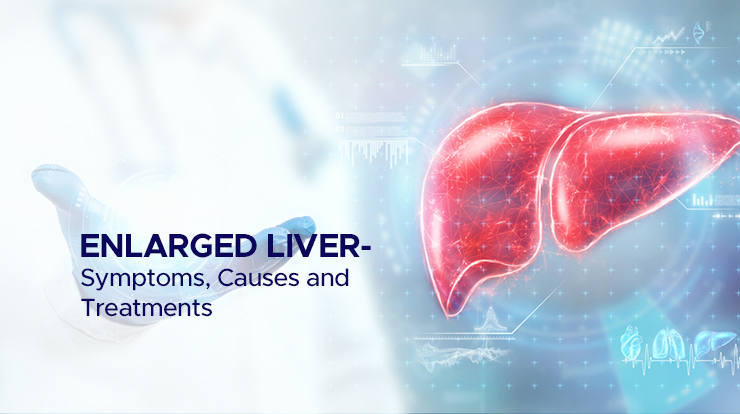
Hepatomegaly, or liver enlarged in size, is an expansion of the size of your liver. The digestive system, which includes the liver, is housed in the upper right abdominal quadrant. The generation of bile, which aids in converting food into energy, elimination of pollutants from the circulation, control of fat accumulation, and production and release of cholesterol are just a few of the vital tasks carried out by the liver, which also aids in digestion.
A major health problem is indicated by liver enlargement. It could be found by your doctor when doing a physical checkup. An enlarged liver is not an illness, but rather a symptom of an underlying condition such as liver disease, heart failure, or cancer. The liver swelling symptoms treatment entails identifying and managing the underlying cause of the disease.
Now that you are aware of what is an enlarged liver, here are some more details to assist you in making the best decision.
There may be no indications of a liver enlarged in size. If liver disease is the cause of an enlarged liver, the following enlarged liver symptoms may also occur:
If you have any concerns about enlarged liver symptoms, fix an appointment with your doctor.
The liver is a sizable organ with a football-like shape that is located in the upper right corner of your belly. With age, sex, and physical size, the liver’s size changes. The liver swelling reason may include:
These are some of the main reasons for enlarged liver.
If you have a liver ailment, you’re at the risk of developing a liver enlarged in size . The following factors can raise your chances of developing liver problems:
Large quantities of alcohol can be harmful to your liver.
Increased risk of liver damage can result from exceeding authorised doses of vitamins, dietary supplements, over-the-counter (OTC), and prescription medications. Acetaminophen overdose is the leading cause of abrupt liver failure in the United States. In addition to being a component in over 600 OTC and prescription drugs, it is also found in OTC painkillers like Tylenol.
Learn about the ingredients in the prescriptions you use. Check the labels. Searching “acetaminophen,” “acetam,” or “APAP” will help. If you’re unsure of how much is excessive, speak with your doctor.
Your chance of developing liver damage may be increased by taking some supplements, such as valerian, ma huang, and black cohosh.
Your risk of liver damage and liver enlarged in size may rise if you have an infectious condition, whether it be viral, bacterial, or parasitic.
Hepatitis A, B, and C can all harm the liver.
You have a higher chance of developing liver disease if you are overweight and eat unhealthily processed meals like those high in fat or sugar.
Your doctor’s approach to managing the ailment that is causing the liver to expand will be the main focus of liver swelling symptoms treatment. The liver enlargement treatment differs since several disorders might cause liver impairment. Abstinence from alcohol use and living a healthy lifestyle are beneficial for patients whose enlarged livers are caused by non-alcoholic fatty liver disease or alcoholic hepatitis, respectively. However, chemotherapy, surgery, or a liver transplant are required when cancer is the cause of the disorder.
The liver is strong and capable of healing itself occasionally. A protracted inflammatory response, however, might harm the body permanently and result in difficulties. It’s important to select a recognised specialist when thinking about liver transplant possibilities in India. Dr Vivek Vij is a highly sought-after liver transplant specialist in India. The lowest (4%) risk of biliary problems has been achieved by him, making him the youngest liver transplant surgeon to perform 800 different transplants.
What causes an enlarged liver?
Ans. An enlarged liver, or hepatomegaly, can be caused by various factors including excessive alcohol consumption, viral infections like hepatitis, fatty liver disease related to obesity, and other conditions that affect liver function.
What are the symptoms of an enlarged liver?
Ans. The symptoms could include a feeling of fullness, abdominal pain or discomfort on the right side under the rib cage, and general signs like fatigue and weight loss.
How do doctors find out if my liver is enlarged?
Ans. Doctors typically diagnose an enlarged liver through a combination of physical exams, where they feel your abdomen, blood tests that check liver function, and imaging tests such as ultrasounds or CT scans to visually confirm the liver’s size.
Can an enlarged liver be treated?
Ans. Treatment for an enlarged liver aims to address the underlying cause. This might involve lifestyle changes such as diet adjustments or quitting alcohol, medication to treat infections or liver disease, and in some cases, surgery if necessary.


